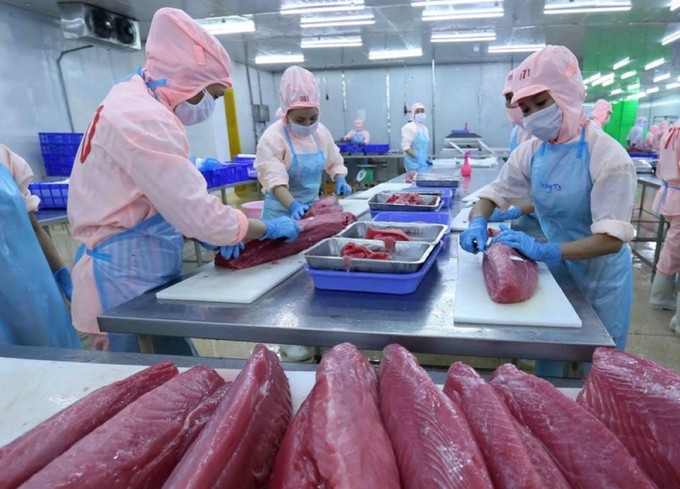Vietnam's fishing industry asked to maintain its position in global market
Vietnam currently is the third largest seafood exporter in the world. The European Union (EU) always demands abundant resources due to the average consumption of around 22 kilograms of seafood per capita.
If Vietnam does not remove the European Commission (EC)'s 'yellow card' for local fishery products, it would not only impact exports to the European Union valued at more than US$500 million each year but also Vietnam’s political position in the international arena.
Suffering heavy losses from EC “yellow card” warning

The European Union (EU) is one of the three key export markets for Vietnam's seafood. Currently, Vietnam has 524 seafood processing enterprises that are approved to export to the EU. Before the “yellow card” that the European Commission (EC) imposed on Vietnamese seafood regarding illegal, unreported, and unregulated (IUU) fishing, Vietnam's seafood export to the EU experienced continuous growth, increasing sharply from US$90 million in 1999 to nearly US$1.5 billion in 2017.
After three years of being imposed the "yellow card", Vietnam's seafood exports to the EU market to significantly decline, reaching US$1.22 billion in 2020. Earlier, the export procedures to the EU took 1-3 days. However, after the "yellow card" was imposed, the processing time was extended to 2-3 weeks.
The IUU Regulation issued by the European Commission (EC) aims to protect marine life from harmful fishing methods and from overfishing, such as the use of explosives during fishing operations, despite the severe environmental damage. This regulation is established uniformly across the EU to prevent and eliminate the import of fishery products sourced from IUU fishing into the EU.
In 2017, when Vietnam received a "yellow card" warning from the European Commission (EC), the country recognized the negative impacts of IUU fishing activities on the development of its fisheries industry. The “yellow card” has led to a significant decrease in seafood exports from Vietnam to the EU, down 12 percent, equivalent to US$183.5 million, in 2019; far worse in 2020 due to the Covid-19 pandemic, presenting an additional decrease of 5.7 percent compared to 2019, gaining US$959 million. In 2022, the EU has dropped from second to fourth in Vietnam's seafood import markets, after the US, Japan, and China.
Joining hands to resolve difficulties in procedures
Recently, seafood enterprises have made joint efforts to remove the "yellow card" and propose several solutions to address the shortcomings in the implementation of the IUU fishing.
Ms. Cao Thi Kim Lan, Director of Binh Dinh Fishery Joint Stock Company, said that the deteriorating fishing infrastructure in coastal provinces has contributed to making slow progress in lifting the "yellow card" and achieving sustainable development goals for Vietnam's fishing sector. Many fishing ports have low capacity and lack safety measures. There are insufficient docking spaces for the large number of fishing boats. Most of the ports have not been fully equipped with cold storage warehouses, operation rooms, sorting areas, water supply and drainage systems, and wastewater treatment plants.
In addition, Ms. Lan also pointed out the restraints in coastal localities, including technical capabilities, fish and seafood certification processes, and traceability for seafood products.
She proposed a rapid improvement of the fishing vessel management database to exploit and connect with the local database system of 28 coastal provinces and cities, making information retrieval faster and easier, and digitalization of verifying and certifying seafood origin.
In reality, Vietnam's marine fisheries are considered to be small-scale and are concentrated in coastal near-shore waters without GPS tracking devices and marine harvesting licenses. Businesses express a desire for flexible regulations for small-scale fisheries in Vietnam and receive information and data on fishing vessels to identify legal sources of materials when purchasing.
Removing the ‘yellow card’ this year is critical to the national interest in developing a sustainable seafood and fisheries sector. It also aims to enhance the country's image in the international arena and affirm Vietnam's role as a responsible member of the global community.








